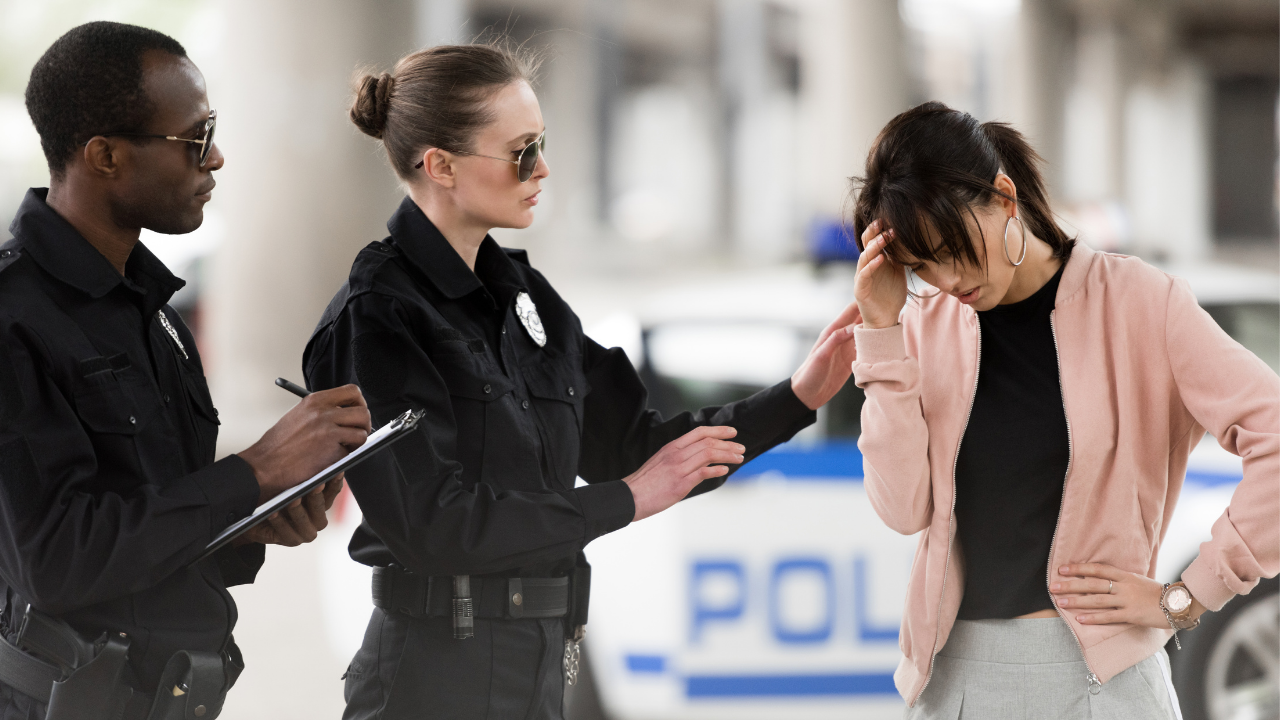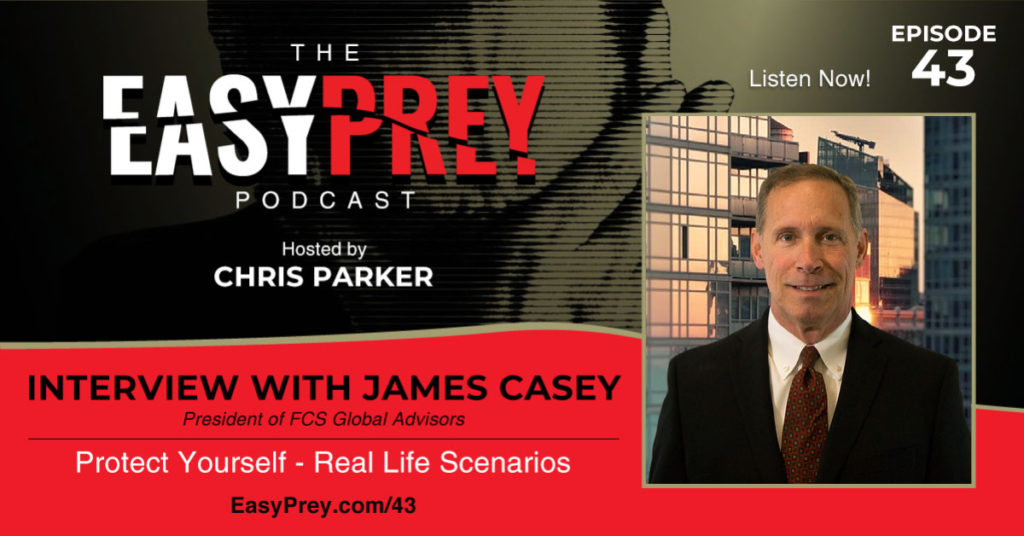
Criminals don’t just randomly pick their targets. They look for easy prey. Find out what you might inadvertently be doing that makes a criminal choose you as their next victim.
Today’s guest is James Casey. James has made a life-long career out of understanding why people break the law. He began in law enforcement and was on the National Security Council in Washington. Then he worked in the FBI for over 25 years, where he was named the Special Agent in charge of the Jacksonville division. James is currently the president of FCS Global Advisors, an investigative and crisis management firm where he has been for the past 8 years.
“The key is to not rationalize your gut feeling.” - James Casey Share on XShow Notes:

- [0:53] – James shares his background in law enforcement and his career path to eventually work in the FBI.
- [1:51] – What James focuses on now is higher end investigation in Florida, primarily litigation and white collar cases.
- [2:24] – In regards to personal security risk, James believes due to the number of distractions, people are always at risk.
- [3:06] – Social media has become a place for people to share too much information which becomes a security risk.
- [3:38] – James shares a scenario of oversharing about your own children.
- [4:53] – You can segregate your social media accounts. Some can be more public for business needs, such as LinkedIn, and then others can be more private for sharing information and photos for friends and family.
- [5:51] – When you’re out and about, you need to be paying attention. Take the earbuds out and watch the people around you.
- [6:49] – James shares how crime doesn’t go away, it just moves to someone or some place that is easier.
- [7:44] – With travel, James presents a scenario and the importance of being prepared for anything,
- [9:20] – Traditional burglaries are targeting empty houses during the day with no alarms and tend to access the back door.
- [10:17] – James shares a scenario of watching a news story about a home invasion and the general majority of burglaries having a back story.
- [12:02] – By the time a story gets to TV, it is a unique story and doesn’t generally match the norm. James tells about an undercover scenario he worked on.
- [14:05] – In regards to car theft, James shares a real-life scenario of learning how cars are stolen in most cases.
- [16:51] – While working in Detroit, James worked with many cases of stolen cars for parts, which is still a problem today. Chris also shares a personal experience of his car being stolen and stripped for parts.
- [20:01] – A book that James has read and recommends by Gavin de Becker called The Gift of Fear. James has done some research into intuition and instinct.
- [21:42] – James shares a scenario of an active shooter in an airport in Fort Lauderdale and how people reacted to demonstrate some people’s intuition.
- [23:05] – Women are often targeted and have a gut feeling that something is wrong but tend to talk themselves out of it.
- [25:03] – In addition to fight and flight, there is also “freeze,” which is a legitimate response for many people. James shares his theory on why some people do this.
- [26:50] – In a lot of situations, people rationalize why something wouldn’t be a gunshot.
- [27:18] – Chris and James discuss stalkers and the types of stalkers that are common to see. James illustrates the types of stalkers with real-life scenarios.
Thanks for joining us on Easy Prey. Be sure to subscribe to our podcast on iTunes and leave a nice review.
Links and Resources:
Transcript:
Chris: Can you share with the audience about your background in law enforcement?
 James: Sure. I was a 32-year veteran law enforcement officer. I was a police officer for five years in Arlington, Virginia. I went over to the state department for a very short period of time. I had applied to a number of federal agencies like a lot of people in the Northern Virginia, Washington DC area do because that's the ground central for federal agencies. I was at diplomatic security for two years. In the meantime, I got hired by the FBI, I went there and I was there for 25 years.
James: Sure. I was a 32-year veteran law enforcement officer. I was a police officer for five years in Arlington, Virginia. I went over to the state department for a very short period of time. I had applied to a number of federal agencies like a lot of people in the Northern Virginia, Washington DC area do because that's the ground central for federal agencies. I was at diplomatic security for two years. In the meantime, I got hired by the FBI, I went there and I was there for 25 years.
I had a terrific career, did a lot of things, moved around a lot, ended up in Jacksonville, Florida as the special agent-in-charge of the office here. I retired in 2012. I had a two-year career in private investigations consulting crisis management. I was recruited to go to a couple of corporate jobs after that. I was the vice-president and executive vice president of security asset protection at two different companies. Now, I'm in another iteration of the private investigation consulting realm.
Chris: Is there anything specific that you're focusing on in your current job?
James: What we're focusing on and there's not a lot of firms like this in Florida, is sort of the higher-end investigation. We're not doing a lot of domestic investigations, or slip and fall injuries, or things like that. We're looking at, primarily, white-collar offenses, litigation support, or expensive litigation, deep background investigations for board members, things like that.
James: Gotcha. From your experience in law enforcement and the FBI, are there things that we do to put ourselves at a personal security risk?
James: I actually believe more and more today because of the number of distractions that are out there that, many people, if not most people are more at risk. Obviously, we could spend the whole hour or however long we've got together talking about the cyber risk, and that's such a subset unto itself, how people have made themselves open on Facebook, Twitter, social media, things that we never would have shared. You have to share every meal, every soccer game, everything that happens on social media. You've made yourself pretty visible and for a marketing person or somebody who's trying to promote themselves as part of their jobs, that's a good thing. But for a lot of people, it's probably not the best thing. Social media has made us numb to personal security. There are so many examples of people that are just really not paying attention to their personal security and put themselves in positions of danger.
Chris: What are some of those things? What we don't want to share, why are those problematic for people to share?
James: Well, because it gives people entree into your personal life that makes you susceptible to scams. I'll tell you a good one. I've seen this before where people overshare about their children. They try to be careful. I use the soccer game example. Johnny is playing soccer and there's a whole bunch of pictures on Facebook of Johnny and it has west main street soccer club. That becomes a basis for a cybercriminal to go, well, who's not going to open up a free picture of Johnny. That becomes a clickbait to get somebody to open a scam email because they've got an interesting invitation to get a free 8 x 10 of Johnny.
Those sorts of things allow bad guys more visibility than they need to see in your life. Obviously, you want to share these with friends and family, and that's the whole idea behind social media.
Chris: That’s one of those kinds of should-I-or shouldn't-I type of scenarios. Who are you willing to share information with and who are you not willing to share information with. I definitely see a lot of people who share everything about their life with everybody, and it's public. And then there are other people that I know that are like, no, I only share pictures of my kid to people that are close friends and family. It's under no public searches can you find it. It's only strictly related to personal interactions.

People can over-share in the on-line world.
James: You’re right. There are so many platforms that you can segregate them. If you're a LinkedIn person, you might accept all the invites that come in because it's just business-related and you don't have to pay attention to people that really have no interest in you. But then Facebook is probably one where you want to be a little bit more judicious and not overshare. You just have a close circle of friends and family that you do have.
Chris: Getting into the physical real world—not that online isn't a real-world, but let's call it the IRL for our discussion here—are there things that we do when we're out and about that put us at higher risk?
James: I see it a lot. Again, some of it is technology-related. If you were to stand on a street corner in any city today and watch people go by, I bet you 50% or more of them have these things in their ear. They're looking down at their devices and just paying no attention. Now, if you're a street criminal looking for a victim, that world is really opened up because people just don't pay attention anymore. One of the single best things people can do to keep themselves safe, especially when you're out and about in a crowded environment, is to really just be paying attention, looking around. My son was a college lacrosse player, they called it head on a swivel, moving around, looking around, looking people in the eye. The fastest way to deter somebody is just kind of look at them. It's sort of a, hey, I'm watching you. Because there are so many other victims out there, crime is about finding the easiest, name of your podcast, prey. You harden your target a little bit and, you know, crime doesn't necessarily go away. It moves on and it sounds kind of cynical, but you just want to not be the victim.
Chris: What's the saying? I don't have to be faster than the bear. I just have to be faster than the person next to me.
James: Exactly. I use the example and it's a totally non-political realm, but when Rudy Giuliani and the chief of police commission in New York talked about how much they did clean up the city of crime. A lot of that crime didn't go away. It went to Newark, and that's just the way the criminal element moves around. It’s like electricity. It finds the path of least resistance and that's where it goes.
Chris: There's just too much work here. Let me go somewhere where it's just easier, I hate to use the phrase, but where it's easier
James: You're right. It is.
Chris: When I've traveled on vacation, particularly in foreign countries, they're always saying, don't wear a backpack on your back because it's easy for someone with an Exacto knife or a box cutter to open up the bottom of your backpack and just take everything out the back of it. Do they make backpacks that have a mesh lining designed to prevent that from happening? Are there other things that we physically do? Obviously, even if we're looking around, is that enough?
James: Well, you mentioned a good one with travel and I challenge people when I do some public speaking, again and I'm guilty of it myself sometimes, although I've become more cognizant of it. How many times do you go to a hotel? Back when we used to go to hotels and you're on the 10th floor, does anybody look for the stairs?
Nobody does that. But if you had to find the stairs in the smoke and darkness, and it's the first night in a hotel in a different city, it would help if you knew where that staircase was to get downstairs in a fire. Because it doesn't happen that much—there are very few hotel fires, they're very safe, everybody has smoke detectors and sprinklers, and so you know the times that it's safe, we make that to be the norm and are never prepared for something really going bad.
Chris: How about our homes? You and I talked about this when we had a previous discussion, I've heard that NRA stickers and flags are potential–not red flags, so to speak to burglars–but something that increases their awareness. This is, hey, there's a gun in this house. I can pawn guns or I can use guns for crime. I wanted to break into this house because I think there's a higher chance. Is that an old wives tale or is there some reality in that?
James: I haven't seen any data and I really was surprised when you told me about that. I'd like to see some because intuitively, you would think or try and think like a bad guy. I don't want to break into an NRA house. If there's a potential for a gun in there, it might be used on me. That goes back to what we were just talking about, the path of least resistance.

A burglar cannot always tell how big a dog is by its bark – that's a deterrent.
Most burglars are interested in unoccupied houses during the daytime when they can maybe go in a back door because a lot of people have rings now and that has driven traditional kick-in-the-front-door thieves down a lot, very interested in a house that doesn't have a dog because sometimes you can't tell how big that dog is or how friendly it is from a bark. Why go there when there are plenty of non-dog houses. Bad guys are looking for houses that don't have NRA stickers, don't have dogs, don't have alarms. And many people don't have alarms, a good sounding alarm that even if it's not monitored if it sets off a huge siren, I got to believe most burglars are going to run from that.
Chris: Just anything that draws attention to the fact that they're there is going to reduce the likelihood that they're going to be able to get inside the house and take stuff.
James: Right. Yeah.
Chris: Are there other myths about home security that you can think of?
James: I heard one this morning, in fact, and I told my wife as we were having breakfast, there was a quick blurb on TV about a home invasion where the homeowner shot and killed the invader, details to follow. I said I got to hear this one because there are very few home-invasion-type robberies where there's not a backstory like narcotics, for example. Again, burglary is a crime of trying to get as much booty as you can quickly, and then get it out the door, and then pawn it, and then again use it just to buy drugs.
The overwhelming number of home invasions involved rival gang members, stealing drugs from one another posing to the police, and some other rivalry between people who were trying to get back at the other person. I would say that's sort of a myth. Not that it doesn't happen, none of these things are. This never happens because there clearly are people just sleeping in their bed at 2:00 AM, and some idiot kicks in the door and wants to do you harm. That happens, but the overwhelming majority of them are not that bad.
Chris: I know. My wife and I, we've watched everything on our TiVo, staying at home, and we've now gone into Dateline and forensics files bingeing. It's funny because like in all those so many of the stories that get publicized about home invasions, it's frequently–when it's not gangs or drugs–it's everybody at work knew this guy had a safe at home, or the wife always wore ridiculous amounts of jewelry, or they talked about the fact that they had all sorts of cash on them.
James: Yeah. These shows are really interesting because by the time it gets to be on a Dateline–and I've actually been on a Dateline before and they do a great job–but by the time that the story gets to Dateline, it's a unique story. It's not the norm because that's what makes it interesting. If you did a story about a normal happening every Friday on Dateline people were like, I see this every night at 5:00 PM. I don't need to tune in to watch Dateline.
We did a thing, back when I was in the FBI, we had a really interesting undercover case, and the agents posed as a front import-export company. They were telling the bad guys that they were sending these high-end automobiles all over the world–Mercedes Benz, and BMWs, and boats, and things like that. At the end of the undercover, after we arrested a bunch of bad guys, two of them disappeared. They didn't know each other, they had nothing to do with each other, but they were high-level offenders. They have this expensive equipment and such so we called America’s Most Wanted, I remember the show. It was on for years and years.
Chris: John Walsh I think.
James: John Walsh, yeah. We called America's Most Wanted and said, Hey, we got a different case that involved a couple of bad guys who sold millions of dollars worth of Mercedes Benz's, and Ford engines, and all this stuff to undercover FBI agents in Detroit. Can you see and do it? They're like, are you kidding us? This is not like just somebody who killed their wife and disappeared to LA. It was a unique story.

Unique crimes make better TV stories.
They literally made that one of the season openings. They came out to Detroit and shot all the film, recreated the event, and had a fake set that was like the undercover operations. My point is, by the time you see these shows on TV, you're talking about a unique crime and that people shouldn't think that that's like the everyday thing.
Chris: Like you said, it would be pretty boring if it was constantly, oh, someone broke a window on a car and stole a phone. Speaking of cars, are there things that make cars a target for either being broken into or being stolen?
James: Yeah, keys in them. We laugh about it. I was having lunch with my local sheriff here in town maybe a year ago, a good guy, been in the business for 40 years. He had set up a license plate reader system throughout the county wherever you exit St. Johns County just South of Jacksonville. There are license plate readers that are just looking for stolen cars and things like that and have done a terrific job of really stopping all kinds of crime. But we were talking about stolen cars.
I said, by the way, how do people steal cars anymore with the alarms and the sophisticated start-remote-start, you have a key fob in your pocket, and everything. He said that's a really good question, Jimmy. He called us chief of detectives, and he goes, hey, I'm talking to a former FBI guy here. How do people steal cars? The guy was like 90% key in the drink tray there, the cup holder. People just leave them there when they go in the store when they go home, and so that's how people were stealing cars, keys are in them.
Chris: It's funny because it's almost probably more prevalent now that it's key fobs, as opposed to physical keys. You get in, you don't have to put your key anywhere. You just drop it down or it falls out of your pocket.
James: Right. Exactly.
Chris: That's funny because when you say that, at least in the US, I don't know if it's prevalent outside the US, there's a neighborhood app called Nextdoor. Periodically, there'll be a rash of someone coming through the neighborhood and ringing everyone's doorbells. You see pictures of them going down the street and just tugging out people's car doors one after another. Inevitably, someone will have their car stuff rifled through and stuff taken out of their car. It almost always turns out that they left the car unlocked, the keys were in it, they had the garage door open, but the car was unlocked in the garage and somebody just walked in and, and took everything out of the car. I've never figured out why people leave–not that I'm picking out women here–why people, why women leave their purses in their cars when they're at home. I haven't quite figured that one out yet.
James: That's a good question. Now, with the key fob thing though, if you have your purse, you have your key. You don't have to take the key out of the purse. They have their purse, it'd be the answer
Chris: Or you're just carrying other things into the house at the same time.
Are there other things that target cars for being stolen? I know, at least around here, it's always been accurate as had been the most common stolen cars because there are so many out there that people are stealing them for parts, but I don't know if there was any specific targeting of like, why are they choosing this Acura versus that Acura?
James: Years and years ago, I worked out at theft and in Detroit. We were in a task force with the Detroit police department and parts were a big deal then, I imagine they still are. I can tell you that in the 90s or so when you took your car to a bump shop to get a fender fixed or a door replaced because you've been in an accident. The numbers were staggering, 70% to 90% of the things you were putting back on your car were just stolen parts because these bump shops would buy these things for a dime on the dollar.

It may cost more to repair your car than replace what was stolen.,
If you pulled in with an Acura, or a Camry, or whatever, you need those parts replaced, it's a very common car. The parts were common. They had boatloads of replacement parts which were a lot cheaper than getting an OEM. You had no idea by the time they painted it up, the car door looks like a car door. It works like a car door. It was really easy to do. Now, there was a crackdown in the middle of the 90s when they started putting VIN numbers on everything. But most of them are just stickers, Mylar stickers unless you're looking for it or something like that. It's better than not having the sticker on there, but with the VIN number.
Chris: Well, my personal experience was that as I have a Jeep Cherokee that was stolen out of my apartment parking lot. It disappeared for, I think it took the police about a week, a week and a half to find it. By the time they found it, it had been stripped of very unusual, but very specific parts. When I was talking with the police officer, she says, it looks like someone had a Jeep that was needing repair and they specifically took just the parts that they needed to repair someone else's car. But in the process of stealing what probably would have been $500, $600, maybe $1000 of parts, they did like $8,000 of damage to the car to get the couple hundred dollars worth of parts. They tore out the dash just to get to one component that was behind the dashboard. I was like, oh my goodness, you destroyed my truck.
James: Yeah. I don't know if they're still a thing, but a couple of years back, airbags were huge because they're so expensive to replace.
Chris: Yeah, I've heard that. I don't think they stole the airbag. They stole the spare tire. It was weird, very odd parts that were not very expensive, but they were very specific. Are there things that we could do that when we're out and about that help us to be more aware of what's going on around us or should we trust our gut if we see people that we don't recognize?
James: I've done a little bit of study on this and actually read some papers about intuition and I'm a huge fan of Gavin de Becker. He wrote a book about 12 or 20 years ago now de Becker had a company, the company is still around. I'll put it up on my website, too. When we're done and I'll give you the address and everything for your listeners. De Becker had a company out in LA that did a lot of profiling for many Hollywood types, people that got letters from people that they were stalking and things like that. I became interested in this notion of, I call it caveman intuition, and the end of the story is that our relatives are all survivors.
You and I had smart relatives. They knew not to go into a cave that had a saber tooth tiger. Maybe their neighbors didn't know better. They went in and so they don't have relatives. De Becker's book is called The Gift of Fear, his first and original book. He talks a lot about that little voice in your head that tells you something's wrong, and how we've–with technology, and education, and becoming smarter animals–we have tried to talk ourselves out of the fact that we humans, really still are animals and have instinct. Half of what a dog does, or more than 90% of what a dog does, it doesn't know what it's doing. It just does it because that's what this is bred into the dog to do, to keep it a viable animal.
We're kind of like that. There really are a lot of places and things in times in our life when we can all think of them when something was happening and you thought, the old phrase, the hair standing up on the back of my neck. That's a thing. That's an instinct that’s in us to say, stop, pay attention, look, danger, do something. I'm a huge fan of paying attention to that. There's a terrific video. I've got it on my laptop and I show it to people sometimes. You can find it online just by Googling.
A couple of years ago there was an active shooter at the Fort Lauderdale airport. You might remember this story. I want to say it was about five years ago. It was a veteran and he was coming back from Alaska and he had a gun in his checked luggage.
He went to the carousel and he took the weapon out of the luggage after he had landed in Fort Lauderdale and just started shooting up the baggage claim area. If you watch that video closely and slow it down and watch it a couple of times, there are people that just stand there. The guy was shooting a couple of people, duck for cover. One guy ducks for cover behind one of those luggage cart chorales when you put $0.50 in. And then he sticks his head out to watch what's going on just in case he wants to get shot. One of the first things besides listening to that little voice in your head saying something's wrong here, I need to readjust my situation to do something, I call it, don't do nothing, do something.
I'm a huge proponent of that. It doesn't mean you have to be paranoid every time you hear a car tire squeal or something like that, but it is that voice in your head. De Becker talks about it in the book. This is particularly applicable to women because they are the ones that can be assaulted much more than men, especially if they're assaulted by a man, many of them are not able to fight off a man. Women will talk about this going into a parking garage or an elevator opens, and there's somebody standing there just then.
There's something about that situation that doesn't seem right to them. An awful lot of them, men too, this isn't just a woman thing. They will talk themselves out of it. They'll say, well, I'm just being paranoid. It's not very social not to do that. I'm just going to go ahead and get in this elevator. I'll just go to that parking garage. I like to say, never panic. Fear is good, never panic, but be afraid early, be afraid fast, because you can always go back and reassess the situation. You can always say, well, that was silly of me to be afraid.
Even a pandemic is kind of like that. Be afraid fast, and then look back and go, okay, well maybe I overreacted, or maybe we didn't need to do this, that, or the other thing. But that little voice saying danger, do something, it can be as simple as waiting for the next elevator just walk by or wait for somebody who looks suspicious to go through the parking garage before you go in there. There's a lot to that, people should pay attention to that and realize that it's a thing.
Chris: Yeah. It's trust what has been bred into us over many, many generations.
James: Men call it their gut. Sometimes you can over-think that and say, I trust my gut on stunt Tesla, or I trust my gut that the Cowboys are going to win this weekend so I bet the mortgage. I'm not talking about that, but here there's a little bit to that
Chris: More were on situational stuff rather than big picture stuff.
James: Usually, it's something that happens quickly in front of you as opposed to thinking about a stock or who was going to win a football game. That's not God, that's just gambling.
Chris: Yes. It's interesting that when you talked about the Fort Lauderdale shooter, I was thinking that you talked about some people just standing there and often we hear the, oh, we have these two mechanisms, we have fight or flight. But I heard someone speaking last year. He says, well, there's a third one that for some reason nobody ever wants to talk about. That's freeze, that when animals are faced with a risk situation, it's always fight or flight. He's like, what the heck? Like, have you ever seen a deer in that whole expression of a deer in the headlights? You startle a rabbit until you glance away. They're just going to freeze and remain perfectly still. It doesn't help in active shooter situations.
James: My theory on that is closely aligned to intellectual realization that when people hear something. They're not used to hearing gunfire all the time so they hear gunfire and the person they do is try and rationalize it away. That's probably fireworks. It’s probably a motorcycle. Backfiring. It might be a gun. It's hard to overcome that, we've intellectualized things to be what's more logical based on our experiences, but that doesn't mean we always mean it's right. I'm not saying be paranoid about every situation hunker down, never go out of your house because nothing bad will happen. That's not what I'm saying, but I'm saying when things happen, just kind of be aware that things happen, and fear quickly, and then go back and figure it out later.

What would your response be to the sound of gunfire… fight, flight, or freeze?
Chris: I've also heard that analogy about the gunshot-sunlight cars backfiring. Then I heard someone say, well, when was the last time you actually heard a car backfire? There are people that have never heard a car backfire that will say gunshot sounds like cars backfiring. If they hear what sounds like a gunshot, they just assume, it's a car backfiring, even though for the most part cars in the last 20 years, don't backfire.
James: That's true. That's a really good point. Motorcycles still do that, but cars don't as much.
Chris: Interesting that we've, for whatever reason, culturally trained ourselves, it can't be gunfire. It has to be something else. Are there others, as we roll up to a close here, are there other situations that we make ourselves easy prey for that I've missed out on.
James: Another one that I've done a little bit of writing on, I have a white paper, I'm going to put on the webpage. I have some good white papers there now. I'll ask you, invite your listeners to go look at them. But another one is kind of stalkers. I've kind of come up with three different variations of stockers. Some of this is research that I’ve done. Some of it's based in de Becker, of course, and then some of it is other research that I've done. The propensity for violence of those stalkers and how you deal with them. The first one that I think is usually not, and I preface this by saying you never know. If anybody's ever in fear of anybody for a good reason, they should call the police. Do what you have to do.
The casual stalkers, this is kind of the scenario where a woman, these are usually men stalking women, usually. They meet at a nightclub. He has kind of an affinity for her. He starts calling her and starts emailing. It was nice to talk to him. The barber says I'm really interested in having a relationship. Then it turns into stalking and you see this happen. Oftentimes, what the victim will do is try to be nice to the person, and try to let them down gently and agree to meet for coffee every now and then, but I don't want to be in a relationship. Really that's not the way it usually works.
If somebody is stalking you and that casual relationship thing they're never going to go away until you just tell them that it's over, and that you're not going to have a relationship with them. You have no interest in a relationship and you really can't negotiate your way out of it or try to be friends, that just doesn't work. Really, unfortunately, the only thing that gets this person who's interested in controlling people. That's what the underlying psychology there is. The only thing that gets him to move on is to find somebody else to stalk or be obsessed over, unfortunately.
Another one is sort of the stranger stalker. This is what de Becker saw. A lot of celebrities see a lot of this. It's where somebody sees you from afar, maybe you work in an office, a big office, and they have an affinity for you, or they see you at the mall or something like that. They start stalking you from afar–sending you emails or trying to get in touch with you, but not coming up to you in the normal way that people have relationships, and introducing themselves, and trying to get a cup of coffee or something like that. They're literally stalking you.
Those can be a little more dangerous, kind of the John Hinckley type thing. They're usually very smart people, high IQ, things like that. In that case, you probably going to need to involve law enforcement to warn this guy off, maybe get a restraining order or something like that.
The third and really the most dangerous is the intimate stalker. This is an interesting phenomenon because these are people that are in relationships with other people. A lot of times, you see violence with people that are in intimate relationships where they hurt each other. We talk about the heat of passion and that's a thing. But I'm talking about stalking where usually, the guy leaves, or is kicked out, or has a restraining order against him. Then stalks the woman after that. That's usually a really dangerous situation because that guy is not operating in the heat of the moment. He's not really pissed off about something right now, he's decided he's going to come back and hurt you.
There are many, many cases, unfortunately, the most famous case we all know about is the OJ Simpson, Nicole Brown case, where every indication that OJ Simpson was going to hurt her, murder her happened. The destruction of property, her calling the police, many times, him being arrested. Here's a really big one, her telling people, that guy's going to kill me. When a woman tells somebody that guy's going to kill me and she ends up dead, what are the chances that he did it are, it’s like 99.9%.
That's a really dangerous situation where somebody is being stalked by an intimate. That's almost always not going to end well. It's hard to deal with. Getting a restraining order doesn't necessarily fix things. Sometimes it amps them up, you’re questioning his masculinity and it's a really dangerous situation that people really need to think hard about that. Most importantly, recognize the warning signs. If you're being stalked by an intimate person, that's a dangerous situation.
Chris: Are there different warning signs for each of these different classifications of stalkers or is it just your previous interaction with them or your lack of interaction with them?
James: In the first case, you've met them in a social situation usually. It's somebody even that, and there's a friendly relationship to start. It's just that, you're not on the same page he is. This goes to talking yourselves out of a problem. This isn't really a problem. He's probably not stalking me, just wants me to be nice to him. Again, that really happens that way, that he just accepts the fact that you're not interested anymore, especially if you’re stalking him and this guy is sending you unsolicited emails, if he's literally following you around. He's only going to end when he realizes.
I used the example of a kid who's obsessed with a toy and he's totally obsessed over it. You can't rationalize with a three-year-old that he's not going to get that toy. You just got to tell him, no, he's not going to get it and move on. Somewhere down the line, he’d be interested in something else. That's kind of the case with that casual.
The second one, the sort of the celebrity one, that's the one where you do become aware of it because you've never met them, but yet you're getting some kind of communication from them, whether it's sending you a note, or a letter, or an email, if they find your email address, or a Facebook invite, or something like that. It's that creepy thing when you feel like you're creeped out by somebody you don't know. Of course, the third one is really the most dangerous, and you do know that because it's somebody you had an intimate relationship with.
Chris: On the third one, if a restraining order potentially causes more issues, what are some of the ways that people can resolve that? Or maybe it's disappearing, moving, changing phone numbers?
James: Literally, the only thing that really makes this a safe situation is where she's just not near him. He can't get to her. Sometimes that means jail or prison because it has to be long-term. It's a circular argument. Don't call the police or get a restraining order because you don't want to piss them off and you don't want to create that third rail that's going to cause him to really hurt you. But if he's out in the system, there's a possibility he gets help. There’s a possibility he gets counseling for anger management and things like that. If he's not in the system, that never happens, but it does have to become a full-blown intervention. The key is just not to rationalize it away and not think that, well, he’s stalking me…
Chris: But I'm sure he won't do anything…
James: Right, this time.
Chris: Yeah, that's scary. I'm looking over my notes here at stalkers and that's startlingly creepy I think is the right word.
James: It really is. And it's kind of a thing.
Chris: As we wrap up here, where can people go to follow you or to find those white papers that you mentioned?
James: Our website for our company is fcsglobaladvisors.us, is the company, or just Google and we'll come up. We have a page called Intel and we put a lot of things on there. We've got previous podcasts. Every month, I do some book recommendations. I got a bunch of white papers on everything from drone security, robotics, I'll put these on there. I have a really good, comprehensive, I wouldn’t say it's good, I'll let others decide, a comprehensive white paper on an active shooter, just a quick primer on what to do. We've all heard the run-hide-fight so take a look at that.
You can follow me on Twitter. I'm at @Jim_Casey_. The company is on Twitter. There are actually two companies, FCS Global Advisors, which is the investigative crisis management consulting firm, and then FCS is actually a $100 million man-guarding-operation that companies use. If you have things that need manned guards, armed, unarmed, we have a lot of clients, literally all over the country, some big data warehouses, the federal government, a wide variety of clients that we look after.
Chris: I'll make sure that we also link to the videos that you mentioned in the book and the videos that you mentioned, we'll make sure that we link to those in the show notes as well.
James: Great.
Chris: Thank you so much for coming on today, Jim.
James: Hey, it's been great. Thanks for having me. I really appreciate it.
Thank you for listening to this episode of the Easy Prey Podcast. If you found this episode helpful, leave a review at easyprey.com/review. Notes and a transcript of this episode with James Casey can be found at easyprey.com/43.


Leave a Reply